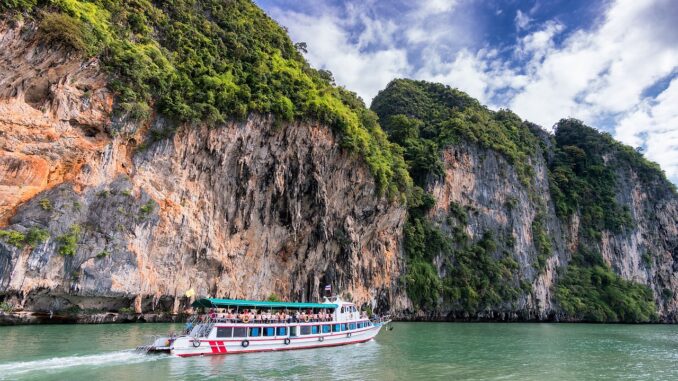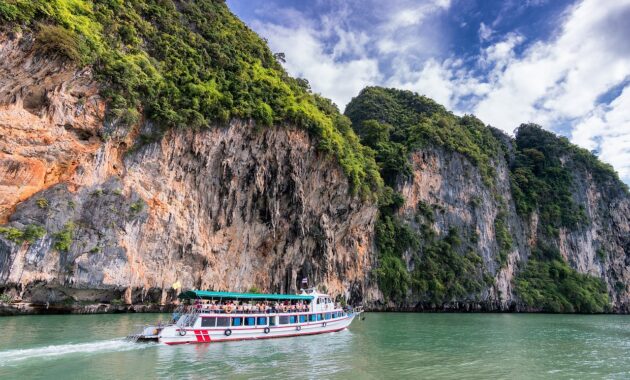
Introduction to Koh Phang Nga
Koh Phang Nga, an enchanting island in Thailand, is a paradise for expats and travelers seeking a blend of adventure, serenity, and cultural richness. Nestled in the Gulf of Thailand, this tropical destination is known for its pristine beaches, lush landscapes, and vibrant communities. Whether you are planning a short visit or a long-term stay, Koh Phang Nga offers a unique experience that caters to diverse lifestyles and preferences.
Cost of Living in Koh Phang Nga

One of the main attractions for expats moving to Koh Phang Nga is its affordable cost of living. While it is not the cheapest destination in Thailand, it is significantly more affordable than many Western countries.
- Accommodation: Rental prices vary based on location and amenities. A simple bungalow can cost as little as $200 per month, while a modern villa may range from $800 to $1,500 per month.
- Food and Dining: Eating local is highly affordable, with street food meals costing around $2-$3. Western-style restaurants charge between $7-$15 per meal.
- Transportation: Renting a scooter is the most common mode of transport, costing around $50 per month. Taxis and boats are also available but tend to be pricier.
- Utilities and Internet: Basic utilities including electricity and water average $50 per month, while high-speed internet costs around $30 per month.
Weather and Climate
Koh Phang Nga has a tropical climate, meaning it is warm and humid year-round. The island experiences three main seasons:
- Hot Season (March to June): Temperatures range between 30-35°C (86-95°F), with high humidity.
- Rainy Season (July to October): Frequent showers but usually short-lived. The island remains lush and green.
- Cool Season (November to February): The most pleasant time of the year, with temperatures around 25-30°C (77-86°F) and less humidity.
Best Areas to Live in Koh Phang Nga
Depending on your lifestyle, Koh Phang Nga offers different neighborhoods suited for various needs.
- Thong Sala: The commercial hub with markets, restaurants, and nightlife, ideal for social and active expats.
- Haad Yuan: A quieter beachside location, perfect for those seeking tranquility.
- Srithanu: Known for its yoga retreats, vegan cafés, and a strong expat community.
- Haad Rin: Famous for its Full Moon Party, best suited for short-term visitors rather than long-term expats.
Work and Business Opportunities
Many expats in Koh Phang Nga either work remotely, run online businesses, or engage in local ventures such as:
- Teaching English: A common job opportunity, with salaries ranging from $1,000-$2,000 per month.
- Hospitality Industry: Some foreigners work in bars, restaurants, or guesthouses.
- Freelancing and Remote Work: Digital nomads thrive here due to the availability of co-working spaces and reliable internet.
- Opening a Business: Many expats start yoga studios, cafés, or tour companies. However, Thai business laws require foreign entrepreneurs to have a Thai partner or specific visas.
Visa Requirements for Expats
Thailand offers several visa options for long-term stays:
- Tourist Visa: Allows 60 days, extendable for another 30 days.
- Education Visa: Available for those enrolled in language or cultural courses.
- Retirement Visa: For those over 50 with financial stability.
- Business or Work Visa: Requires sponsorship from a Thai employer.
It’s essential to stay updated on visa policies as they change frequently.
Cultural and Social Life
The island has a welcoming community of both locals and expats. Learning basic Thai phrases is appreciated, although English is widely spoken. Respect for local traditions, such as temple etiquette and cultural customs, enhances the experience of living in Koh Phang Nga.
Popular Activities
- Diving and Snorkeling: The island offers excellent diving spots like Sail Rock.
- Yoga and Wellness Retreats: Srithanu is a hub for holistic practices.
- Hiking and Nature Exploration: Visit Than Sadet National Park for stunning waterfalls and trails.
- Full Moon Party: A bucket-list experience for travelers seeking nightlife excitement.
- Muay Thai Training: A great way to stay fit and learn Thai martial arts.
Healthcare and Safety
Koh Phang Nga has quality healthcare options, though not as advanced as Bangkok.
- Public Hospitals: Cheaper but may have language barriers.
- Private Clinics: More expensive but offer better services.
- Health Insurance: Highly recommended for expats to cover emergencies and hospital visits.
The island is generally safe, with low crime rates. However, it’s wise to take standard precautions, especially regarding motorbike safety and personal belongings.
Education for Families
For expats with children, Koh Phang Nga has a few international schools and homeschooling communities. Options include:
- Phangan International School: Follows a Western curriculum.
- Green School Phangan: Focuses on eco-friendly and holistic education.
Pros and Cons of Living in Koh Phang Nga
Pros:
✔ Affordable cost of living compared to Western countries
✔ Stunning natural beauty and relaxed lifestyle
✔ Thriving expat and digital nomad community
✔ Numerous activities and wellness opportunities
✔ Low crime rates and friendly locals
Cons:
✖ Limited job opportunities for non-remote workers
✖ Heavy rains during monsoon season
✖ Visa regulations require careful planning
✖ Limited healthcare facilities for serious medical conditions
Conclusion
Koh Phang Nga is a dream destination for those seeking a balance between adventure, relaxation, and cultural immersion. With its affordable lifestyle, welcoming community, and stunning natural surroundings, it’s no wonder expats and travelers continue to flock to this island paradise. Whether you are a digital nomad, retiree, or traveler looking for an extended stay, Koh Phang Nga offers an unforgettable experience.